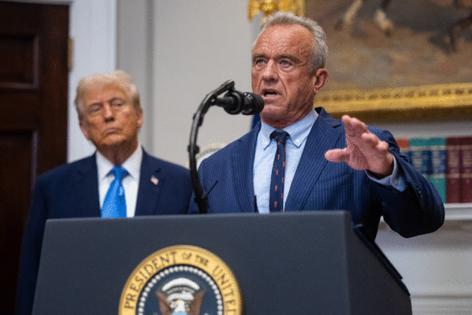Despite escalating anti-vaccine rhetoric, most Americans support vaccine mandates, surveys find
Published in News & Features
At an explosive news conference on the causes of autism Monday, President Donald Trump espoused decades-old, long-debunked theories linking autism to the childhood vaccine schedule.
Public health experts immediately pushed back, decrying Trump's comments as false and dangerous.
And despite heightened anti-vaccine rhetoric from the administration, surveys show that most Americans support vaccine mandates for children.
Overall support has declined slightly, from 77% who would support a policy requiring parents to vaccinate their children from preventable diseases, such as measles, mumps, and rubella, in 2019 to 73% in 2025, according to a January 2025 survey by the University of Pennsylvania's Annenberg Public Policy Center. Researchers said the percentage change was not "significantly different."
They attributed the decline in part to changing attitudes among Republicans, who are more likely to support an option for parents to opt out of vaccinating children for medical, religious, personal or philosophical reasons.
A later survey, taken in April 2025, showed heightened support for mandating among public schoolchildren the vaccine that protects against measles, mumps and rubella.
While support for those mandates has dropped among Republicans, support among Democrats and independents has risen.
The findings are among the most recent data from a series of surveys on vaccine mandates that Annenberg has been conducting for years.
Paul Offit, the director of the Vaccine Education Center at the Children's Hospital of Philadelphia, said he's encouraged to see strong public support for vaccines. Offit is a longtime critic of anti-vaccine activists, including Health and Human Services Secretary Robert F. Kennedy Jr.
"RFK Jr. doesn't represent most parents. He represents a small slice. There is a general public acceptance of vaccines," said Offit, who was not involved in the Annenberg research.
Spotlight on MMR vaccine
An April 2025 survey by Annenberg that focused specifically on measles, mumps and rubella vaccine mandates found that 70% of the public supported MMR mandates in public schools — a significant increase from August 2023, when just 63% of the public said they supported them.
Most Americans at all education levels and across political parties said they supported MMR vaccine mandates. The higher a person's education level, the more likely they were to support a mandate. Just under 90% of people who identified as Democrats said they supported a mandate, compared to 61% of Republicans and 69% of independents.
Annenberg director Kathleen Hall Jamieson said she was surprised to see increases in support for MMR mandates, given the position of some federal officials.
For example, Kennedy, a longtime anti-vaccine activist, said this spring, amid a measles outbreak in Texas, that people should get the measles vaccine but that the government should not mandate it.
And Florida's surgeon general announced last month that he wants to remove all vaccine mandates in the state.
Meanwhile, some states have taken the opposite approach. After the Centers for Disease Control and Prevention signaled major shifts in how it approaches immunization, Pennsylvania said it would allow pharmacists to dispense vaccines based on the recommendations of professional medical societies, not just government advice. The state has also joined a public health coalition with seven other Northeastern states to ensure vaccine access.
Vaccines in the news
Jamieson remembers the era before mass vaccination for deadly diseases like polio and measles.
"I had measles and my children didn't, because they were vaccinated. Children of my generation had polio. I've lived through a process of watching the benefits of vaccines in the lives of people I care about," she said.
Amid a flurry of news stories this year about Trump's approach to vaccines, it's possible people have learned more about vaccine mandates and are now more likely to support them, Jamieson said.
"When you have a topic that becomes more salient because it's in the news, and the topic is one that potentially directly affects you and your family, like exposure to measles — I think it's plausible to believe we've increased the public understanding of the vulnerability of those who are unvaccinated," Jamieson said.
Testing that hypothesis is a goal of future Annenberg surveys on vaccines, she said.
The effect of anti-vaccine rhetoric
Offit said spreading vaccine misinformation from a large platform, as Trump did at Monday's news conference, is dangerous.
Trump said that children get too many vaccines — falsely claiming that children get 80 vaccines instead of the approximately 30 doses they are recommended to receive before the age of 18.
Trump also suggested that parents space out vaccines for measles, mumps, and rubella, a debunked idea from a decades-old retracted study that falsely linked autism to the MMR vaccine and goes against long-established health recommendations. He also claimed, without scientific proof, that autism is caused by acetaminophen use during pregnancy.
"That was the single most dangerously irresponsible news conference a president has given regarding health," Offit said.
Offit said it's crucial for health experts to continue to spread the correct information about vaccines. But he worries about the damage done by Trump's rhetoric.
"We have to just try and provide good information and do it again and again. But (Trump and RFK Jr.) have a huge podium," he said. "All you're going to see now is an increase in numbers of vaccine-preventable diseases, and no impact on autism. None."
_____
© 2025 The Philadelphia Inquirer. Visit www.inquirer.com. Distributed by Tribune Content Agency, LLC.







Comments